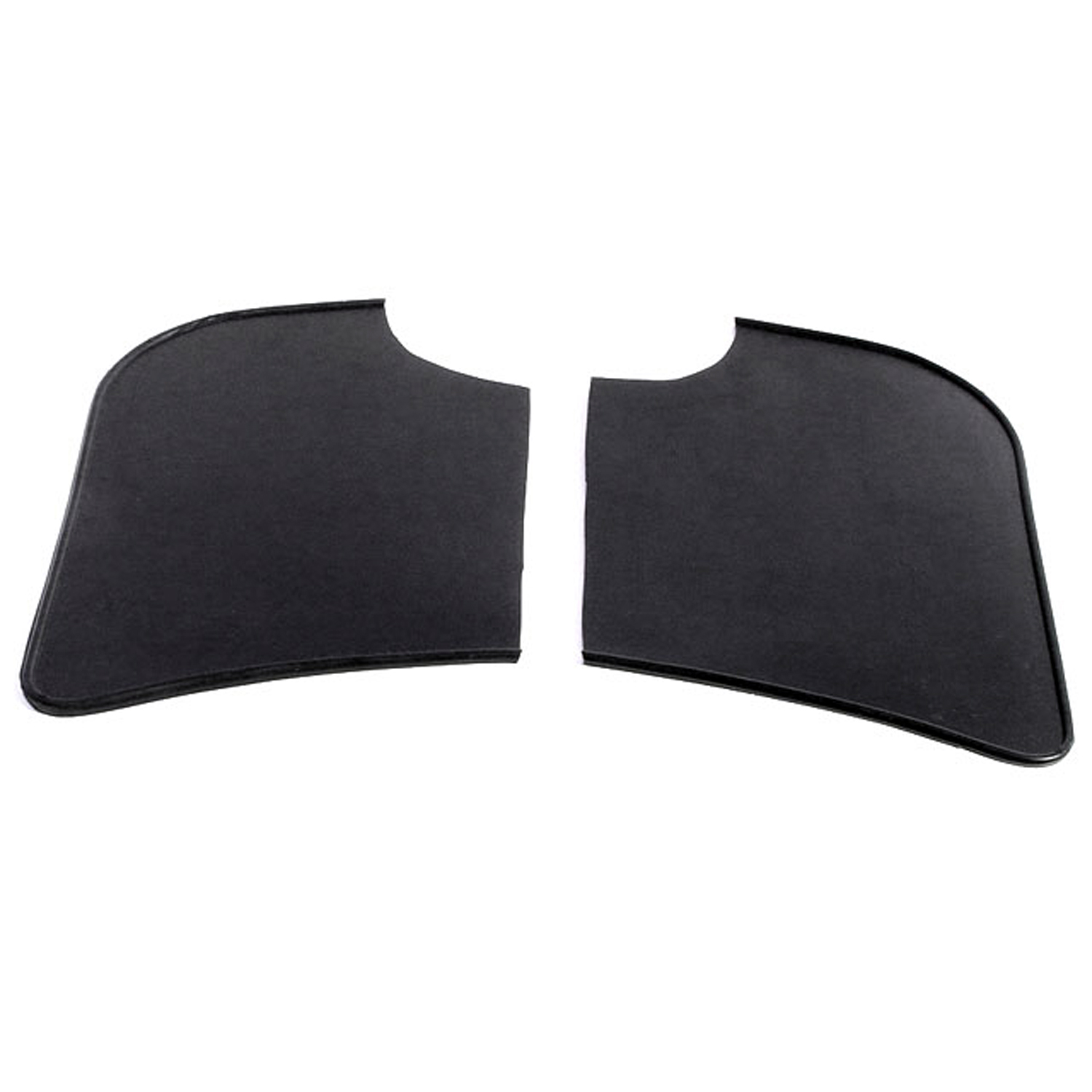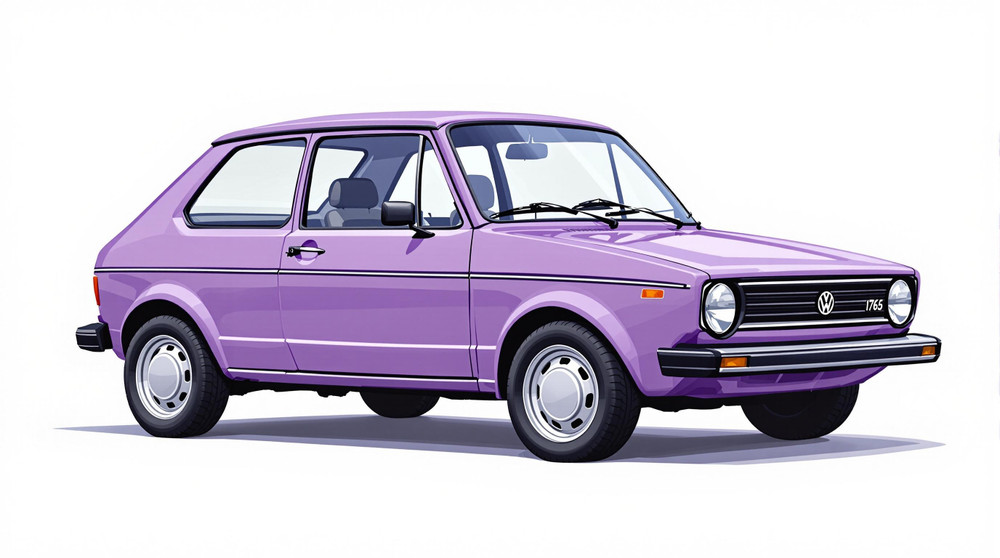Image of 1976 Volkswagen Rabbit, Note: These illustrations use artistic license and may differ from actual historical models.
Performance Metrics
Fundamental Metrics
Emotional Appeal
MMP Rating
| Engine Specifications | |
|---|---|
| Engine Options: | Inline 4 |
| Displacement Range: | 1.5L - 1.6L |
| Horsepower Range: | 48-70 HP |
| Torque: | 70-80 lb-ft |
| Compression Ratio: | 8.2:1 |
| Ignition System: | Electronic Ignition |
| Cooling System: | Water-cooled |
| Performance Specifications | |
| 0-60 Time: | 14-16 seconds |
| 1/4 Mile Time: | 19-21 seconds |
| Top Speed: | 90 mph |
| Transmission and Drive | |
| Drive Type: | FWD (Front Wheel Drive) |
| Transmission Type: | 4-speed manual or 3-speed automatic |
| Fuel and Efficiency | |
| Fuel System Type: | Carburetor |
| MPG: | 25-30 MPG |
| Dimensions and Brakes | |
| Brakes: | Front disc, rear drum |
| Wheelbase: | 94.5 inches |
| Weight: | 1,800 lbs |
Note: Specifications for classic cars are given to the best of our ability, considering the limited and variant data available.
Introduction
The 1976 Volkswagen Rabbit hopped onto the automotive scene as a sprightly newcomer that would redefine compact cars. Born from the innovative minds at Volkswagen, this German-engineered hatchback was designed to offer an economical yet enjoyable driving experience. At a time when fuel efficiency became paramount due to the oil crisis of the 1970s, the Rabbit emerged as a practical solution with a touch of European flair. A unique fact that car enthusiasts may find fascinating is that the Rabbit was the first front-wheel-drive car produced by Volkswagen for the North American market, marking a significant shift in their design philosophy.
Design and Innovation
The exterior of the 1976 Volkswagen Rabbit boasted clean lines and a utilitarian charm that resonated with drivers looking for simplicity and functionality. Its rounded square silhouette was a departure from the curvier designs of the era, making it instantly recognizable. Inside, occupants were greeted by a no-frills interior that focused on ergonomics and comfort over luxury, with materials chosen for durability and ease of maintenance. Technologically, the Rabbit was ahead of its time with features like electronic fuel injection – a rarity among compact cars then. Volkswagen offered the Rabbit in a palette of colors, with Mars Red and Miami Blue being among the popular choices. The two-door hatchback body style became iconic, although four-door variants were also available.
Historical Significance
The 1976 Volkswagen Rabbit left an indelible mark on automotive design by popularizing the front-wheel-drive configuration in compact cars. Its transverse engine layout was innovative and influenced many automakers to adopt this space-saving design. The Rabbit's blend of economy, practicality, and driving enjoyment set it apart from contemporaries and laid the groundwork for future generations of compact cars.
Performance and Handling
Underneath its modest hood, the 1976 Rabbit featured a peppy 1.6-liter four-cylinder engine that delivered spirited performance for its class. With a top speed around 90 mph and capable of reaching 0-60 mph in just over 10 seconds, it was no slouch for daily commuting or zipping around town. The Rabbit's handling characteristics were praised for their nimbleness; it tackled bumps and windy roads with poise uncommon in economy cars of that period. Drivers often remarked on the engine's distinctive hum and how connected they felt to the road behind its simple yet functional steering wheel.
Ownership Experience
The Volkswagen Rabbit quickly became a favorite as a daily driver due to its reliability and fuel efficiency. It also found its way into auto shows and occasionally onto racetracks in various modified forms. Maintenance was straightforward, making it an ideal choice for owners who preferred to handle repairs themselves. Parts were readily available, further adding to its appeal as an economical vehicle to own.
Fun Facts
A little-known tidbit about the 1976 Rabbit is that it was manufactured in Westmoreland County, Pennsylvania, making it one of the first European cars to be produced on American soil. While not known for holding any major speed records, its sales success helped establish Volkswagen as a major player in the compact car segment. Despite some criticisms over time regarding rust issues or electrical gremlins, these quirks have only added to the character and stories surrounding this beloved hatchback.
Collector's Information
Today, collectors might find that a well-preserved 1976 Volkswagen Rabbit can fetch anywhere from $5,000 to $15,000 depending on condition, originality, and history. While exact production numbers are elusive, tens of thousands were produced; however, survivors in mint condition are becoming increasingly rare. The value trend for vintage Rabbits has been generally appreciating as nostalgia fuels demand for classic economy cars with character.
Conclusion
The 1976 Volkswagen Rabbit represents more than just another compact car; it signifies an era where efficiency met fun in an affordable package. Its legacy endures in every front-wheel-drive hatchback zipping through city streets today. As we look back at this plucky little car's history, we can't help but appreciate how it leaped into drivers' hearts and stayed there.
1976 Volkswagen Rabbit Catalog of Parts
 1976 Volkswagen Rabbit Gravel Shields. Molded flat without metal backing plates-FS 40Gravel Shields. Molded flat without metal backing plates. Apply with contact cement. 7-5/8" long X 5-5/8" wide at top. Pair
1976 Volkswagen Rabbit Gravel Shields. Molded flat without metal backing plates-FS 40Gravel Shields. Molded flat without metal backing plates. Apply with contact cement. 7-5/8" long X 5-5/8" wide at top. PairWhy Choose Metro?
For over 100 years, Metro Moulded Parts has been the pinnacle of quality in classic car restoration parts. Our commitment to precision and authenticity in every component ensures a perfect fit and an OEM-level appearance.
- Expert Craftsmanship & Quality: Each part is a testament to our dedication to reliability and perfection, crafted from original designs and thoroughly tested.
- Advanced Technology: We use cutting-edge techniques to create flawless, long-lasting parts that surpass others in performance.
- SuperSoft Sponge – The Ultimate Door Seal: Not only are our door seals 30% softer than competitors', but they're also guaranteed to never leak. They effectively reduce wind and road noise, enhancing your classic car's comfort and driving experience.
- Proudly American: Our parts are a product of American craftsmanship, made in the USA with a spirit of excellence and heritage.
- Unrivaled Warranty: We back our products with a 30-year industry-leading warranty, a testament to our confidence in their quality.
Join us in preserving the legacy of classic cars with parts that are crafted for perfection, not just made.

